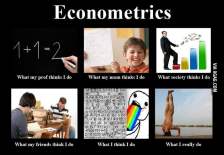from Lars Syll One of the most important tasks of social sciences is to explain the events, processes, and structures that take place and act in society. But the researcher cannot stop at this. As a consequence of the relations and connections that the researcher finds, a will and demand arise for critical reflection on the findings. To show that unemployment depends on rigid social institutions or adaptations to European economic aspirations to integration, for instance, constitutes at...
Read More »Bagehot’s engaging naiveté
from Asad Zaman Chapter 2 of Goodhart’s “Evolution of Central Banks” cites in detail several arguments made by Bagehot (pronounce Badge-it) in favor of a free banking system without a Central Bank. After listing them, he notes that Bagehot is “engagingly naïve”, as a gentle critique. It is astonishing that a hard-nosed practical financial analyst like Bagehot would indulge in such visionary daydreams about a “free market” system. This testifies to the power of ideology to blind one to the...
Read More »Sudan to be used as guinea pig for cash abolition, universal basic income and total surveillance
from Norbert Häring Sudan has a transitional government that depends on the goodwill of the USA. This is an opportunity to use the country for the largest field trial to date, to put an entire population on the digital leash through cash abolition and a universal basic income. For several years now, the World Bank, Better Than Cash Alliance and various UN organizations have been massively promoting and advertising the purely digital transmission of financial aid for the needy in poor...
Read More »Economics education in a post-pandemic world
from Maria Alejandra Madi Ten years after the 2008 global financial crisis, the commodification of health, the spread of fiscal austerity programmes, deep social marginalization and climate change challenges revealed that health issues are “vital matters” that economists should address. Moreover, the outcomes of the coronavirus crisis call for a reflection on the contemporary threatens related to individual freedom, control on individuals and insecurity in social interrelations. Indeed,...
Read More »The illusion of precision
from Ikonoclast (originally posted as a comment) A policeman puts his knee on the neck of a black man in Minneapolis for 8 minutes 46 seconds. A statue to a slave trader falls down in Bristol. This recalls the butterfly effect of Chaos theory. There is no humanly constructed model which would allow one to predict the second specific event from the first specific event. A broader probabilistic model might make predictions of protests and demonstrations after the first event, especially...
Read More »Econometric self-deceptions
from Lars Syll One may wonder how much calibration adds to the knowledge of economic structures and the deep parameters involved … First, few ‘deep parameters’ have been established at all … Second, even where estimates are available from micro-econometric investigations, they cannot be automatically imported into aggregated general equilibrium models … Third, calibration hardly contributes to growth of knowledge about ‘deep parameters’. These deep parameters are confronted with a novel...
Read More »Cars and drivers—in the age of inequality
from David Ruccio How many of you read Car and Driver magazine? Not many of you, I presume. But maybe you should. At least the June 2020 issue. It’s certainly a sign of our obscenely unequal times that a magazine better known for its reviews of foreign supercars and domestic muscle cars and for an editorial policy that courts controversy only when it attacks SUVs (in favor of minivans and cars) highlights the story of Oliver, Jason M. Vaughn’s family’s 260,000-mile Subaru in a piece...
Read More »MMT — Keynesianism with an expansionary twist
from Lars Syll Expansionary policy with a strong redistributive component is an attractive proposal … Higher output and real wages would likely stimulate productivity growth. Global warming can and should be attacked seriously. With regard to foundation myths for MMT, Chartalism adds little to the observation that a modern macro economy operates on the basis of fiat money supported by state power which transcends enforcing the mere payment of taxes. Functional finance is the heart of...
Read More »Taxpayers bailing out capitalists
from Norbert Häring In Germany and beyond, public policy in response to the Corona crisis operates with an unspoken basic assumption: the claims of capital are sacred. This is unfair and economically unreasonable. German economists largely agreed on how not to deal with the corona crisis. Sending a cheque to all taxpayers, as the US government did, is considered an unsuitable anti-crisis measure. After all, the 1200 dollars were too little for 30 million who lost their jobs within a few...
Read More »Seeding doubt to provoke thinking outside the cage
from Alanso Kihano (originally posted as a comment) What’s the use of economics? I think Alan Kirman’s post is completely off the target. Economics is used to achieve political aims. Politics it the first and major use of economics! The major purpose of economics today is to educate (or brainwash if you prefer) specialists, who can serve, and run the current socio-economic system without understanding it. Therefore, economics is obliged to create complex, but inadequate models. That suits...
Read More » Real-World Economics Review
Real-World Economics Review




